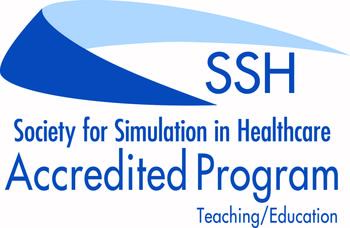The Lab for Immersive Technologies and Simulation achieves ground-breaking accreditation.
The College of Public Health is proud to be the nation's first Society for Simulation in Healthcare (SSH)-accredited Lab for Immersive Technologies and Simulation at a public health college. This pioneering facility redefines how health professionals practice and reinforces George Mason University's leadership in cutting-edge technology that revolutionizes public health education and workforce development.

“This prestigious recognition highlights the dedication and excellence of simulation programs that meet rigorous standards and contribute to advancing the field of health care simulation,” said Kristyn Gadlage, the director of accreditation for SSH. SSH-accreditation is an elite achievement, with only 250 institutions worldwide recognized for advancing simulation excellence. Accredited programs set a gold standard for health care education and are more likely to drive improved patient outcomes.
The college’s Lab for Immersive Technologies and Simulation is an interprofessional and transdisciplinary research and instructional center. At 8,000 square feet, the lab encompasses modular spaces replicating practice settings or converts multiple spaces for extended reality (XR). The lab is strategically positioned in Peterson Health Sciences Hall on George Mason's Fairfax Campus.
This central location allows students across all College of Public Health departments and schools access to this state-of-the-art space for innovation. The lab is designed for transdisciplinary immersive learning with human patient simulators and XR—spanning virtual reality (VR), augmented reality (AR), and mixed reality (MR).

In 2022, Dean Melissa Perry announced a bold vision to expand the lab and make XR and simulation technology available to every student in the college. The lab is led by Chief Innovation Officer Bethany Cieslowski and a dedicated team of Certified Healthcare Simulation Educators who are working to double the lab’s capacity within the next few years, ensuring that every student experiences this transformative learning.
"With this strategic accreditation, we are poised to provide every student in the college the opportunity to extend their learning through immersive technologies and simulation. This interprofessional learning environment offers high-impact skills and critical thinking in a low-risk, safe setting. This level and intensity of training could not be delivered through classroom learning alone," Perry said. "Our approach empowers and prepares graduates for clinical practice by developing skills and confidence that traditional methods simply cannot replicate."
James Casey, director of Virginia Serious Game Institute at George Mason and a leader in immersive technologies, said, "It has been truly inspiring to witness and support the college’s cutting-edge advancements in a transdisciplinary teaching environment. The SSH accreditation is an achievement that solidifies the lab as a true center of extended reality excellence. The potential for revolutionizing public health education is unlimited.”
The integration of immersive technologies in 2020 enabled the college to address workforce needs and expand its reach into social work, nutrition, health administration and policy, and beyond. The lab's mission is clear: harness the power of technology to advance interprofessional education, research, and patient safety through digital innovation. By leveraging ground-breaking technology, the lab advances the college's mission through collaboration, research, and innovation. The college is dedicated to revolutionizing interprofessional education and practice, to ultimately advance public health on a global scale.
Students who step into this innovative space don't just learn—they experience. From mastering complex skills and critical thinking to practicing effective opioid crisis interventions, immersive technologies prepare learners for the challenges of tomorrow. "Extended reality transforms the way we learn," said Cieslowski. "It's not just about creating a virtual environment—it's about creating opportunities for real-world impact, ensuring our students leave George Mason prepared to lead."
Looking ahead, the college plans to extend its reach, aiming to incorporate immersive technologies into all disciplines in the college. With a vision to forge strategic partnerships with corporate leaders and academic organizations, George Mason is driving the future of healthcare simulation.
Visit the Lab for Immersive Technologies and Simulation web page for academic publications and prior coverage about the college's Immersive technologies and simulation capabilities.
For media inquiries, contact Michelle Thompson at mthomp7@gmu.edu.
In This Story
Related Stories
- September 29, 2025
- August 19, 2025
- August 18, 2025
- August 15, 2025
- June 13, 2025
